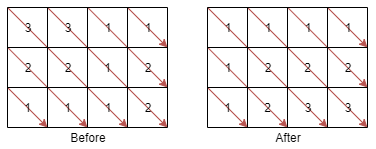Given an array of integers arr, replace each element with its rank.
The rank represents how large the element is. The rank has the following rules:
- Rank is an integer starting from 1.
- The larger the element, the larger the rank. If two elements are equal, their rank must be the same.
- Rank should be as small as possible.
Example 1:
Input: arr = [40,10,20,30] Output: [4,1,2,3] Explanation: 40 is the largest element. 10 is the smallest. 20 is the second smallest. 30 is the third smallest.
Example 2:
Input: arr = [100,100,100] Output: [1,1,1] Explanation: Same elements share the same rank.
Example 3:
Input: arr = [37,12,28,9,100,56,80,5,12] Output: [5,3,4,2,8,6,7,1,3]
Constraints:
0 <= arr.length <= 105-109 <= arr[i] <= 109
Solution: Sorting + HashTable
Time complexity: O(nlogn)
Space complexity: O(n)
C++
|
1 2 3 4 5 6 7 8 9 10 11 12 13 14 |
// Author: Huahua class Solution { public: vector<int> arrayRankTransform(vector<int>& arr) { set<int> s(begin(arr), end(arr)); unordered_map<int, int> m; int r = 0; for (const int v : s) m[v] = ++r; vector<int> ans(arr.size()); for (int i = 0; i < arr.size(); ++i) ans[i] = m[arr[i]]; return ans; } }; |
